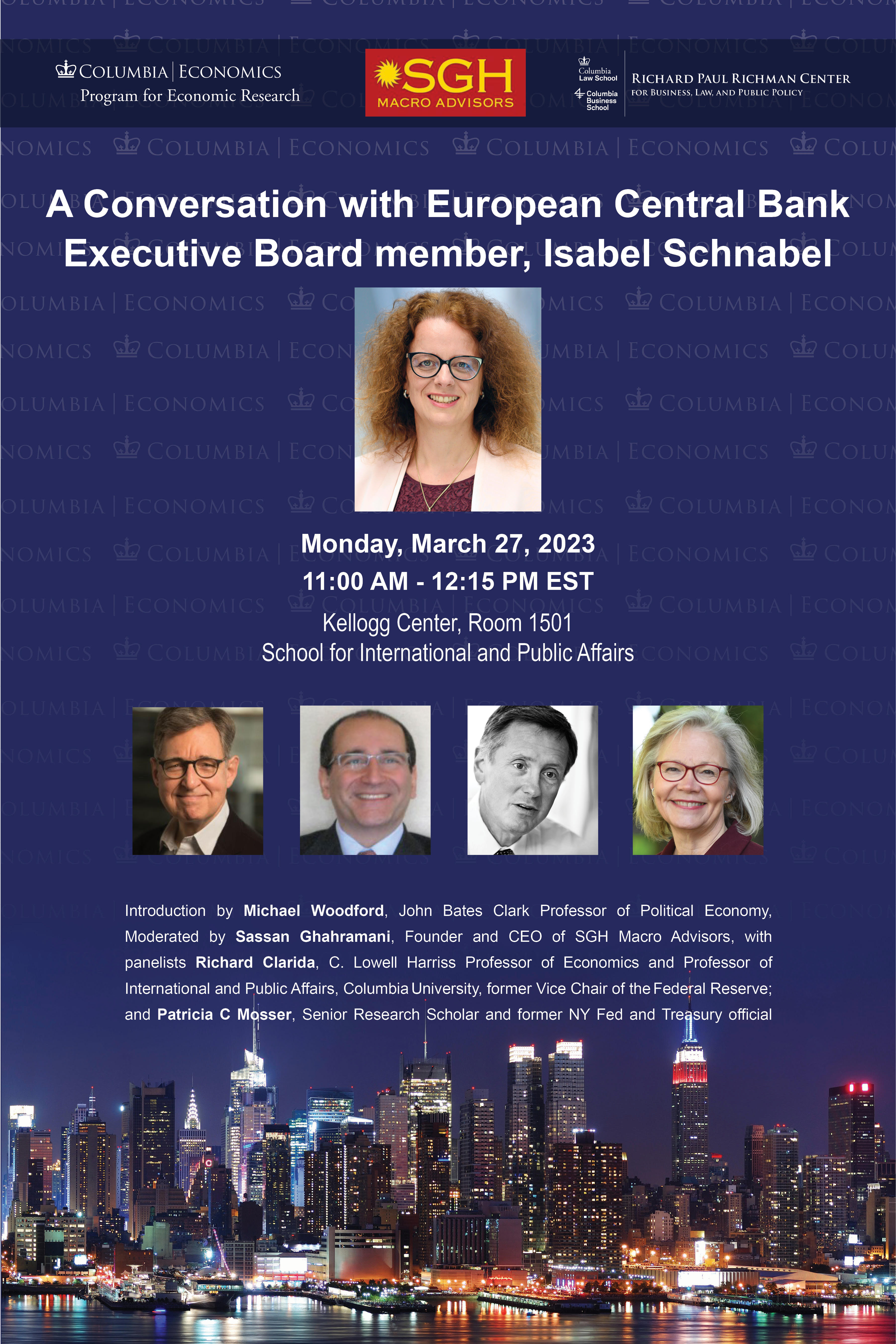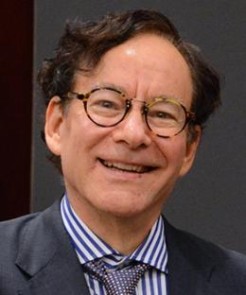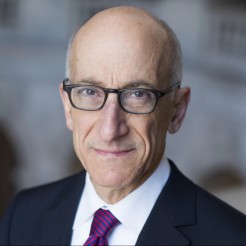A Conversation with European Central Bank Executive Board Member, Isabel Schnabel

Is Crypto Trading Finance or Gambling?

Industry advocates and many policymakers assert that crypto trading is part of our financial system and should be regulated under banking, securities and commodities laws. Others argue that crypto trading should be separated as completely as possible from the traditional financial system and should be regulated as a form of gambling that emulates finance. Who is right?
The evening will start with a presentation by Todd Baker on "Crypto Trading and The Purpose of Finance" with responses by our distinguished panelists.
Co-hosted by the Richard Paul Richman Center for Business, Law, and Public Policy, the Columbia Law School Center for Law and Economic Studies and the Briger Family Digital Finance Lab of the Digital Future Initiative.

Gregory Baer
Greg Baer is the President and Chief Executive Officer at the Bank Policy Institute. Previously, he served as President of The Clearing House Association and Executive Vice President and General Counsel of The Clearing House Payments Company, the largest private sector payments operator in the United States.
Prior to joining The Clearing House, Mr. Baer was Managing Director and Head of Regulatory Policy at JPMorgan Chase. He previously served as General Counsel for Corporate and Regulatory Law at JPMorgan Chase, supervising the company’s legal work with respect to financial reporting, global regulatory affairs, intellectual property, private equity and corporate M&A, and data protection and privacy.
Mr. Baer previously served as Deputy General Counsel for Corporate Law at Bank of America, and as a partner and co-head of the financial institutions group at Wilmer, Cutler, Pickering, Hale & Dorr. From 1999 to 2001, Mr. Baer served as Assistant Secretary for Financial Institutions at the U.S. Department of the Treasury, after serving as Deputy Assistant Secretary. Prior to working for the Treasury Department, Mr. Baer was managing senior counsel at the Board of Governors of the Federal Reserve System.
Mr. Baer received his J.D. cum laude from Harvard Law School in 1987, and served as managing editor of the Harvard Law Review. He received his A.B. with honors from the University of North Carolina at Chapel Hill in 1984.

Todd H. Baker
Todd Baker is a Senior Fellow at the Richard Paul Richman Center for Business, Law, and Public Policy at Columbia Business School and Columbia Law School.
He teaches an advanced fintech seminar for law and business students at Columbia and writes extensively on fintech and banking topic for academic journals and other publications including the Financial Times, The Wall Street Journal, the Harvard Business Review and the American Banker.
He is also the chair of the board credit committee at Accion Opportunity Fund, the nation's leading CDFI nonprofit small business lender, and acts as an advisor to, and investor in, venture capital firms and a number of fintech and banking startups. From 2016 to 2018 he was a Senior Fellow at the Mossavar-Rahmani Center for Business and Government at Harvard Kennedy School.
Before taking on his academic posts, Mr. Baker had a 14-year career as the chief corporate strategy and development officer at three large domestic and international retail, commercial and corporate banks, preceded by two decades as a San Francisco-based corporate partner with the international law firms Gibson, Dunn & Crutcher LLP and Morrison & Foerster LLP.

Jeff N. Gordon (Moderator)
Jeff Gordon is Richard Paul Richman Professor of Law at Columbia Law School and co-director of the Richman Center for Business, Law and Public Policy and co-director of the Millstein Center for Global Markets and Corporate Ownership. He teaches and writes extensively on corporate governance, mergers and acquisitions, comparative corporate governance, and the regulation of financial institutions. He is the co-editor of the Oxford Handbook of Corporate Law and Governance (2018, 2d edition in preparation) and co-author of Principles of Financial Regulation (2016), which addresses the challenges facing regulators of financial institutions and markets in an interconnected and evolving global financial system.
Prof. Gordon is longtime fellow of the European Corporate Governance Institute (ECGI) and a Visiting Professor at the University of Oxford.
Before becoming a law professor, Prof. Gordon was an associate in a New York law firm and a staffer at the U.S. Treasury.

Linda Jeng
Linda Jeng is the Chief Global Regulatory Officer and General Counsel at the Crypto Council for Innovation. She is a Washington veteran, having spent most of her career in financial regulation and stability at the Federal Reserve Board of Governors and other regulatory agencies, the Treasury Department, the Senate, and the Financial Stability Board in Switzerland.
Jeng was the Chief Policy & Regulatory Officer for the Centre Consortium, the stablecoin standards organization, and the Global Head of Policy at the startup Transparent Financial Systems.
She is a Visiting Scholar on Financial Technology and Adjunct Professor of Law at Georgetown University Law Center’s Institute for International Economic Law and a Senior Lecturing Fellow at Duke Law School.

Timothy Massad
Timothy Massad is currently a Research Fellow at the Mossavar-Rahmani Center for Business and Government at the Kennedy School of Government at Harvard University, and the Director of the Center’s Digital Assets Policy Project. He is also a nonresident scholar at the Brookings Institution and a consultant on financial regulatory and fintech issues.
Mr. Massad served as Chairman of the U.S. Commodity Futures Trading Commission from 2014-2017. Under his leadership, the agency implemented the Dodd Frank reforms of the over-the-counter swaps market; harmonized many aspects of cross-border regulation, including reaching a landmark agreement with the European Union on clearinghouse oversight; declared bitcoin and virtual currencies to be commodities; and enhanced cybersecurity protections. Previously, Mr. Massad served as the Assistant Secretary for Financial Stability of the U.S. Department of the Treasury. In that capacity, he oversaw the Troubled Asset Relief Program (TARP), the principal U.S. governmental response to the 2008 financial crisis. During his tenure, Treasury recovered more on all the crisis investments than was disbursed. Mr. Massad was with the Treasury from 2009 to 2014 and also served as a counselor to the Treasury Secretary. Prior to his government service, Mr. Massad was a partner in the law firm of Cravath, Swaine & Moore, LLP. His practice included corporate finance, derivatives and advising boards of directors. He managed the firm’s Hong Kong office from 1998 to 2002 and represented governments and corporations on transactions in China and throughout Asia. Mr. Massad was also one of a small group of lawyers who drafted the original ISDA master agreements for swaps.
Mr. Massad received a J.D. from Harvard Law School and a B.A. from Harvard College.